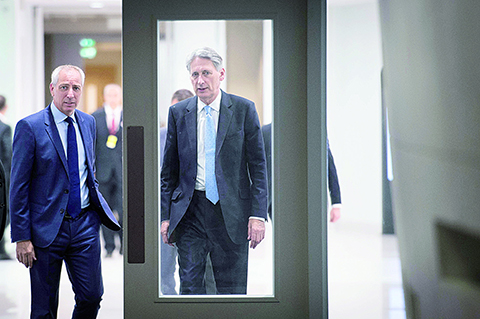 LONDON: Britain's Chancellor of the Exchequer Philip Hammond arrives to tour the IBM office in London yesterday as the preliminary estimates for 2017 Q2 GDP are published. - AFP
LONDON: Britain's Chancellor of the Exchequer Philip Hammond arrives to tour the IBM office in London yesterday as the preliminary estimates for 2017 Q2 GDP are published. - AFPLONDON: Britain's economy hobbled along in the second quarter, barely recovering from a weak start to the year as industrial production and construction flagged amid uncertainties over the country's exit from the European Union. The economy grew by a quarterly rate of 0.3 percent in April-June, a meager rate that is barely above the 0.2 percent of the first three months of the year, the Office of National Statistics said yesterday.
Economists have been downgrading their forecasts for Britain's economy as the country embarks on the process of leaving the European Union and negotiating new trade relations. Yesterday's figures show that the economy, which had initially weathered well the uncertainty of the Brexit vote a year ago, is in a new, weaker phase. "It's the underlying trends that matter," said Lucy O'Carroll, Aberdeen Asset Management's chief economist. "They don't look favorable at the moment, given the uncertainties around Brexit and the pressure on household budgets from higher inflation."
The International Monetary Fund this week cut its forecast for British economic growth this year to 1.7 percent from 2.0 percent previously. Others are more pessimistic, with financial services firm PwC expecting 1.5 percent. Ratings agencies Moody's has also warned about prospects for the British economy. Growth in the second quarter was driven by services, which increased by 0.5 percent compared with 0.1 percent in the first quarter stretching from January to March.
Retail and film production showed improvement, the ONS said. Motion pictures were the second biggest contributor from the services sector, growing by 8.2 percent. Manufacturing swung from 0.3 percent growth in the first quarter to a 0.5 percent decline amid a slowdown in car production. The results also weaken the likelihood that the Bank of England's Monetary Policy Committee will raise interest rates from their record lows of 0.25 percent. Though inflation is above the 2 percent target, it moderated in June to 2.6 percent from a near four-year high of 2.9 percent in May.
"The confirmation of the lackluster performance of the economy so far this year surely also diminishes the chance of an interest rate hike any time soon, especially as growth prospects for coming months have become increasingly skewed to the downside," said Chris Williamson, chief business economist at IHS Markit, as he focused on the second quarter.
'Little momentum'
The latest quarterly reading of 0.3-percent growth "confirms that the economy has little momentum because consumers are enduring falling real wages (on high inflation) and businesses are holding back from spending due to Brexit risk", said Samuel Tombs, chief UK economist at Pantheon Macroeconomics.
British GDP slowed in the first quarter after output of 0.7 percent in the final three months of 2016. British inflation is meanwhile being supported by a Brexit-fuelled slump in the pound pushing up import costs-although the annual rate managed a slowdown to 2.6 percent in June from a near four-year high of 2.9 percent in May.
"The good news is that the worst of the exchange rate induced inflation should start to roll off... which can offer support to the key retail and services sectors," said Neil Wilson, senior market analyst at ETX Capital. -Agencies










